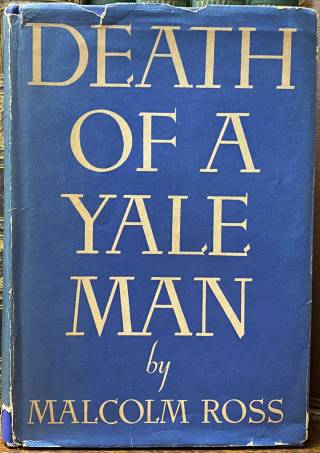In 2005, disgusted by Ivy-heavy triumphalism about the war in Iraq, I searched in Yale’s Sterling Memorial Library for examples of wiser civic-republican leadership by scions of privilege who’d transcended and sometimes sacrificed their own prospects to strengthen the republic, not the plutocracy. One of them, Thomas William Lamont II, would have been an uncle of Connecticut Governor Ned Lamont had he not left Harvard as a freshman to fight fascism in World War II, only to die in a submarine that was lost off the coast of Japan nine years before Ned Lamont was born. I profiled him in The American Prospect in 2006.
I should also have profiled then an even more highly instructive example of labor and civic leadership set by Malcolm H. Ross, a son of an “old stock,” prosperous family, who graduated Yale in 1919 but plunged into years of body-wracking labor alongside miners and oil drillers and became a New Deal official with the National Labor Relations Board. In 1939, Ross published Death of a Yale Man, a memoir-cum-report-cum-jeremiad that’s a worthy companion to Orwell’s Down and Out in Paris and London and his Homage to Catalonia. Ross’s book is especially instructive for Americans right now, amid today’s organizing efforts, strikes, and controversies over elite college admissions.
When I discovered Death of a Yale Man in 2005, leaders of the “global war on terrorism” and on “Islamo-fascism” included President George W. Bush (Yale class of 1968); Vice President Dick Cheney (Yale dropout, ’61); Iraq Coalition Provisional Authority administrator (i.e., proconsul) L. Paul Bremer III (’63); CIA Director R. James Woolsey (’68. Bush’s Yale classmate); Director of National Intelligence John Negroponte (’60); Deputy Secretary of Defense Paul Wolfowitz, who as a Yale political science professor had taught Cheney’s chief of staff I.L. “Scooter” Libby (’72); Bush’s “axis of evil” speechwriter David Frum (’82); Reagan State Department veteran Robert Kagan (’80); Kagan’s father, the Yale historian of ancient empires Donald Kagan, a fervent Iraq War booster; and former New Republic editor Peter Beinart (’93), a noted Iraq War hawk who later recanted that position and whose book The Good Fight seemed to say it all.
Some Yale undergraduates whom I was teaching at the time were all in with the crusade: some headed to Special Forces, others to pro-war think tanks. But few of them understood how deepening inequalities and unjust, injurious working conditions at home were weakening the misadventures abroad. Yet those failed, top-down crusades, not only in Iraq and Afghanistan but also in Cuba and Vietnam, have always prompted a few heirs of privilege to challenge their elders’ premises and practices. Even World War I, which Ivy leaders from Woodrow Wilson on down presented as “the war to end all wars” and “to make the world safe for democracy,” seeded only more wars and fascism and prompted the disillusion but also the dedication of people like Randolph Bourne and Malcolm Ross.
